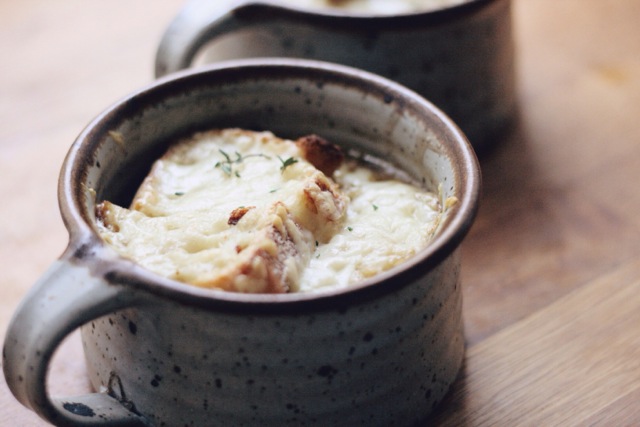
Ode to the Onion<.h1>
Editor’s Note: This week’s Eating and Drinking Poems post is a collaboration between guest writer Nicole Gulotta, Chilean poet Pablo Neruda , the island of Capri, an unknown (presumably French) soup genius, and the humble onion. With Nicole’s help, we hope you can savor the beauty of this mundane vegetable’s literary and culinary transformation.
Today, we consider the onion. There may be a bowl of them on your counter, or several tucked next to a large bulb of garlic, waiting to be peeled and sliced. Compared to other, more glamorous ingredients–figs, pomegranates, and chocolate come to mind—the onion is positively ordinary. But Pablo Neruda knew a little something about the ordinary, and wrote 225 odes that breathed new life into the mundane objects that surround us every day.
Most of Neruda’s odes were written in the mid-1950s while living on the island of Capri. In All The Odes, editor Ilan Stavans writes that Neruda sought to use “loose, jazzy rhythm to describe, often in ecstatic ways, the power of an apparently uninteresting item . . . In his stanzas, he portrays himself as in a state of constant communion with nature, a mystic in love with all things in his environment.”
No subject was too dull. Chairs, tables, the dictionary, ironing, and a jar of mayonnaise are all treated like precious gold coins, and made to be seen in a different light once we’ve finished the last line of his poem. The odes are a call to action, urging us to pause and consider with fresh eyes all the beauty that can be found in the world.
ODE TO THE ONION
by Pablo Neruda
Onion,
luminous flask,
your beauty formed
petal by petal,
crystal scales expanded you
and in the secrecy of the dark earth
your belly grew round with dew.
Under the earth
the miracle
happened
and when your clumsy
green stem appeared,
and your leaves were born
like swords
in the garden,
the earth heaped up her power
showing your naked transparency,
and as the remote sea
in lifting the breasts of Aphrodite
duplicating the magnolia,
so did the earth
make you,
onion
clear as a planet
and destined
to shine,
constant constellation,
round rose of water,
upon
the table
of the poor.
You make us cry without hurting us.
I have praised everything that exists,
but to me, onion, you are
more beautiful than a bird
of dazzling feathers,
heavenly globe, platinum goblet,
unmoving dance
of the snowy anemone
and the fragrance of the earth lives
in your crystalline nature.
Perhaps the most marvelous lines in this poem are “under the earth / the miracle / happened.” Neruda wants us to reach below the soil’s surface, to the place where life begins. He peels away the onion’s layers to reveal its beauty. In paying tribute to this vegetable, I can think of no better recipe than French Onion Soup for a cold winter’s day.
French Onion Soup
An old recipe from the Roman era, this French Onion soup goes well with cold days and Pablo Neruda’s “Ode to the Onion.”
Ingredients
3 tbsp unsalted butter
3 tbsp extra virgin olive oil
3 pounds thinly sliced brown onions (4-5)
2 tsp salt & freshly cracked pepper
1 bay leaf
1 tbsp balsamic vinegar
2 sprigs thyme, leaves removed
4 cups vegetable stock
4 oz Gruyere, grated
12 baguette slices
Instructions
1. Bring a large cast iron pot to the stove and melt the butter and oil over medium heat. Add the onions and stir well to coat. Season with 2 teaspoons salt and a few turns of freshly cracked pepper. Cook for 15 to 20 minutes, or until the onions have softened and a few strands are just beginning to turn golden.
2. Reduce the heat to medium low. Toss in the bay leaf, cover, and cook for 30 to 40 minutes more. I like to check my onions at 20 minutes, just to be sure they’re not sticking to the bottom of the pan. For the remaining 10 to 20 minutes, come back occasionally to give the pot a stir. If your onions still aren’t done, be patient and give them more time. They’re done when the onions have become an almost creamy mound in the bottom of your pot. They will be slightly golden, but don’t need to be dark brown.
3. Before moving on, heat your oven to 450 degrees and set out soup bowls on a sturdy baking sheet. Add the balsamic vinegar, thyme, and vegetable stock. It’s important that you taste the soup now and adjust the seasonings until it tastes just right to you. Simmer for 10 minutes more.
4. Ladle the soup into bowls and top with three slices of bread and a mound of cheese. Bake for 10 minutes, or until the cheese is melted and brown in spots.
Photo, recipe, and post by Nicole Gulotta, of the literary food blog Eat This Poem.
- Book Club Announcement: Wild Words by Nicole Gulotta - April 23, 2020
- Eating and Drinking Poems: Neruda’s “Ode to the Onion” - January 16, 2014
SimplyDarlene says
Lest time should be wasted on debate, the repetitious onion, also know as the Walla Walla, takes crunchy hold of dirt’s most outstanding sugar.
‘Tis absolute truth that it’s sweet, sweet, sweet – raw; but be still my salivating tongue, caramelized alongside asparagus (now that’s a stalking green beauty) on hot wires, grilled – perfection.
lynndiane says
Just noticed this post today…I love french onion soup, thanks for sharing the recipe (and the ode), Nicole! Can you use any type of onion (eg. white or yellow instead of brown)? just wondering…
Elizabeth O'Brien says
No. White or yellow onions are known to occasionally explode when prepared this way. Please, for your own safety, use brown onions.